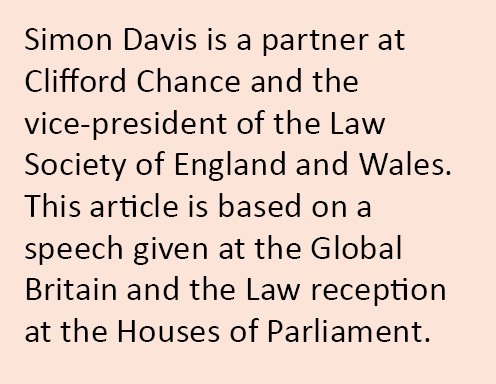Despite Brexit, England and Wales is a global legal centre that can provide certainty
The judges of England and Wales are of the highest calibre, and are experienced in dealing with commercial disputes that have an international dimension, says Simon Davis
The Law Society of England and Wales, alongside the Bar, the judiciary and the legal profession generally, has been running a campaign for the past two years highlighting the benefits of England and Wales as a global legal centre. For some years, the competition to be the forum of choice for the resolution of legal disputes has been fierce. The reason why is often misunderstood. It is because when business can be confident that its business differences will be resolved in a jurisdiction in a way that is familiar, non-partisan, expert and commercially focused, they will bring their business to that jurisdiction beyond the resolution of disputes and have confidence in that jurisdiction when its representatives sit on the other side of the negotiating table
And the present uncertainties caused by Brexit has given the competition a stick to beat us with. Indeed, the words ‘it’s all terribly uncertain’ tend to be the conclusion of far too many question and answer sessions involving the ‘B’ word.
However, there are some absolute certainties that will continue and are at the heart of this campaign. The reason why clients choose English and Welsh law have not changed. English will remain the international language for business. The common law is one thoroughly familiar to the English speaking nations around the world from the US to Australia, Canada to Hong Kong, India to Singapore. Even where the parties come from civil law jurisdictions, so many of them are familiar with the benefits of our system of law, which evolves alongside complex developments in the world of business and finance and uses a strong bench of precedent.
And, fundamentally, whatever the outcome of Brexit, it leaves unaffected the application of the Rome I and II Regulations, meaning that Brexit has no impact on a party’s choice of law. The choice of the laws of England and Wales will continue to be respected.
The judges of England and Wales will still be of the highest calibre, experienced in dealing with commercial disputes that have an international dimension. At any one time, 80 per cent of the cases in the Rolls Buildings have one or both parties coming from overseas and are specialist where specialism is required – the financial list being a fine example of how our judges adapt to ensure that disputes arising from the world of finance are resolved by those who know exactly what they are talking about and deciding upon. Our world-class solicitors and barristers will still be here working as part of an open global community to resolve the modern day disputes, so many of which have a cross border element.
And for anything else, London is a highly-respected home for arbitration with world class arbitrators, legal advisers and arbitration organisations whose arbitration awards are enforced effectively around the world. All these certainties remain. So what’s left? There are those that say that if English and Welsh law is chosen (and therefore naturally England and Wales would be the choice of jurisdiction) there may be courts across Europe who will not recognise that jurisdiction choice or not enforce our court judgments. So, better to choose another jurisdiction and therefore another law.
Even before the Brussels Convention, England and Wales showed itself to be an open jurisdiction recognising the choice of laws of others and enforcing the judgement of others. I hear no suggestion that such openness should change, and in circumstances where their own citizens and companies are so often involved in cross border disputes, where even a small online business is exposed to the rules and regulations outside its own countries’ borders and where those citizens and businesses more than ever before will need certainty, I see no reason why our friends in Europe should seek to erect barriers in the way of those citizens and companies’ choices of law and jurisdiction. Freedom of client choice and the legal enforcement of that choice lies at the heart of the rule of law, contrasted with the law of the jungle. I am optimistic that arrangements will be reached which allow UK and European citizens and corporates to continue to choose the law and jurisdictions that suit them best. I am also optimistic that the benefits of England and Wales as a global legal centre will continue to attract business to our shores, but we owe our clients and our system a responsibility to ensure that those certain benefits are neither taken for granted nor overlooked by clients or government.













